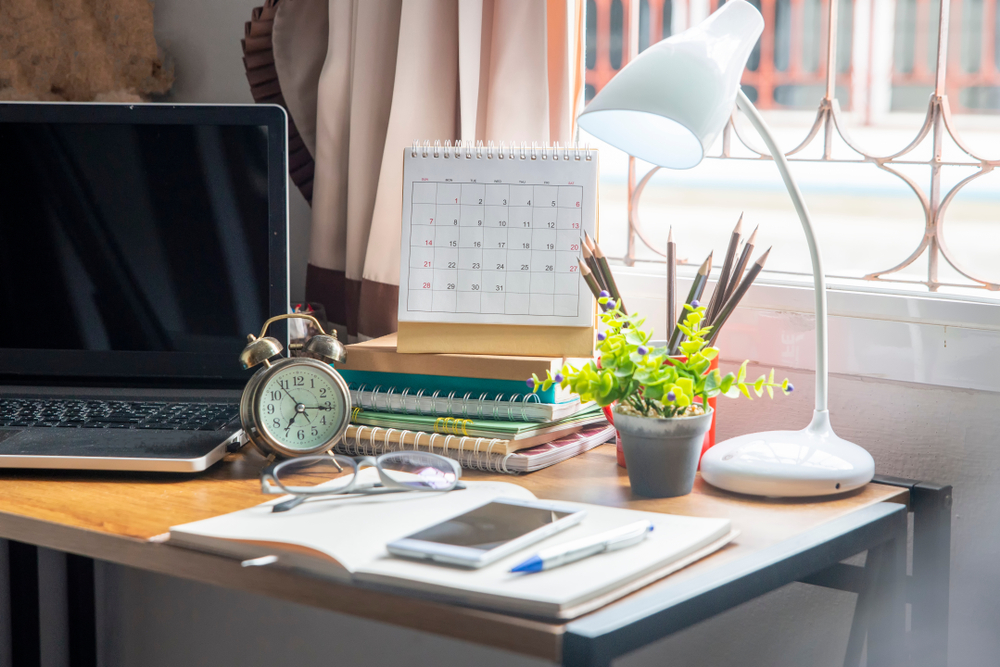How you study is greatly influenced by your environment, and the way you set up a desk or study space can make a real impact on your overall academic performance.
And creating the right atmosphere that inspires you to learn and supports your studying goals is easier than you think.
Here are our top tips to organizing your own studying space so that you – and your desk – totally make the grade:
1. Choose Your Space
Not everyone has the luxury of a large home office, and especially if you’re in student halls, your study space could be limited.
But studying on your bed, sitting on the sofa or working in a messy room is not conducive to effective learning.
You need a space that is dedicated to studying, even if it’s a small desk set up in the corner of the room.
2. Get Rid of Clutter
It can be so easy to let clutter take over your study desk, as books, notepads, magazines and cups build up during a full-on study day.
But for effective academic study, the clutter simply has to go. Too much unnecessary ‘stuff’ on your desk will become a distraction, leaving little space for what you actually need.
A clean, organized desk is what you are aiming for.
As the saying goes, a cluttered space can lead to a cluttered mind, hindering focus when you are working on getting on top of your study game.
3. Embrace the Ergonomic
Comfort is key to keeping you focused, so a good desk and chair are essential to creating an effective study space.
You will need the top of your desk to be ideally resting between your waist and rib cage when you are sitting down, so you can easily rest your elbows without hunching forward.
Also, your chair should fit neatly to the height and size of your desk. Your chair should support your lower back and set at a height which means you can comfortably place your feet flat on the floor.
As well as the height of your chair, your PC monitor or laptop screen should also be set at eye level and ideally no less than 1½ feet away from you, so you can avoid any eye strain. And look after your wrists too, while you work – if you suffer from wrist pain, then consider swapping to a vertical mouse, which takes the strain as you work at your computer.
4. Lights and Temperature

So, now you have the ideal desk setup, you need to give a little thought to the environment around you, including lighting and temperature. Both can have a negative impact on your learning power.
You need adequate lighting in your study area – too dark, and it can tire you out, too bright, and it can be bad for your eyes.
As well as natural light, a good desk lamp will help you focus on the work at hand, while a standard overhead light will work to brighten your surroundings.
And don’t let your room get too hot or cold – researchers have shown that between 72°F and 75°F is best for productive study.
5. Personalize Your Space
While we have already seen that a cluttered desk is not a good look when it comes to your study space, a little personalization is actually a good thing.
A few photos, some inspirational quotes or a motivating poster can all help you to focus on the academic prize by helping to remind you about all the reasons – family, professional dreams, the difference you may be able to make – why you are working so hard.
Personalizing your space will also make that study space feel like yours, and a place you enjoy.
6. Switch Off Distractions
Oh, the joys of the digital world, where we are never more than a fingertip away from our smartphones and devices.
However, when it comes to effective study, all this connectivity is not a good thing.
Your phone is one of the topmost distractions when it comes to getting your head down, and if left switched on is a constant reminder there could be more interesting things going on.
So, unless you are using it as a calculator or other App tool (and we suggest popping it onto airplane mode if you are), then switch off your smartphone to turn off all those potential distractions.
7. Use the Space for Studying Only
After all this sorting and planning your study space, our final tip is a simple one – only use your study desk for studying, nothing more.
Creating an area that is exclusively dedicated to the activity of studying will keep that focus going, so don’t be tempted to also use it for non-curriculum activities such as eating, gaming or watching TV.
By dedicating your study space exclusively, you will quickly come to associate the space with your learning and be inspired to focus on achieving your end educational goal.
And that is key to improving, as well as enjoying, your academic performance.







